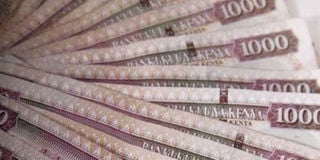Banks tighten rules to check dirty cash tricks

The Central Bank of Kenya has announced that the October 1 deadline to replace old Sh1,000 banknotes will not be extended. PHOTO | FILE | NATION MEDIA GROUP.
What you need to know:
- This week, several banks were in the process of reconfiguring their Automated Teller Machines (ATMs) to reject the old notes, a loophole the crooks have been using to deposit cash.
Once the exercise is completed before the end of this month, the reconfigured machines will only accept the new notes.
Police in Murang’a last week arrested two people who were ‘lending’ money to residents and only taking payments in new currency.
Options are fast running out for corrupt individuals racing against time to clean their dirty money as the government intensifies the crackdown on ill-gotten wealth.
This comes on the back of Thursday’s announcement by the Central Bank of Kenya that the October 1 deadline to replace old Sh1,000 banknotes will not be extended.
HEAVY BLOW
After weeks of what appeared to be dirty tricks to exchange huge amounts of money by a few individuals and their agents, multiple sources revealed to the Sunday Nation that several local banks, saccos and micro-finance companies had been forced to seal loopholes that have been exploited by those seeking to inject their ill-gotten wealth into the financial system.
This week, several banks were in the process of reconfiguring their Automated Teller Machines (ATMs) to reject the old notes, a loophole the crooks have been using to deposit cash.
Once the exercise is completed before the end of this month, the reconfigured machines will only accept the new notes.
The financial institutions are also employing tough scrutiny for new account holders and regular reporting of suspicious transactions in order to minimise chances of laundering dirty money.
Kenya Bankers Association Chairman Habil Olaka told the Sunday Nation that banks were now reporting large cash exchanges to the Central Bank of Kenya, a move that will deal a heavy blow to those who had hoped to split their bundles of old notes and exchange them below the threshold required to open accounts.
“We are asking for sufficient identification for those asking to exchange significant amounts of cash for the new notes. We know that, due to the deadline set for the demonetisation of the old Sh1,000 notes, you would expect some people to try and use the banking system to sneak in the dirty money and we have to put in heightened measures without inconveniencing those doing genuine transactions,” Mr Olaka said.
SPLITTING CASH
Under the CBK guidelines, people with cash below Sh1 million would ordinarily walk into any bank without the need for an account and ask for an exchange to the new notes.
Crooks have reportedly been splitting the cash into batches below this threshold and walking into various banking halls to ask for an exchange according to junior officers in local banks who requested anonymity.
Mr Olaka said the identification process has a central information sharing framework which also reaches the Central Bank of Kenya, flipping open any safe cover for those holding physical cash and seeking to exchange them for new notes. Others are said to have resorted to opening new accounts using proxies and facilitating deposits into the accounts before they are withdrawn shortly.
This tool has become under sharp monitoring by the banks who are using the Know Your Customer (KYC) frameworks to interrogate and monitor new accounts.
“When one is opening the account, we need to know a lot more including the source of income and the type of economic activity, which must justify the cash available for deposit. If it fails to add up then the count will not be opened,” Mr Olaka said.
The new restriction that cash can only be transacted locally after CBK instructed regional central banks to cease accepting the old notes has further minimised options for those wishing to clean their dirty money.
So desperate are some bulk cash holders that police in Murang’a County last week arrested two people purporting to ‘lend’ money to residents who were only required to repay the money using the new currency notes.
WILLING BORROWERS
Murang’a County Commander Josephat Kinyua said the suspects were seized after locals reported that some suspicious elements were issuing the old currency bank notes to willing borrowers from whom they only required a photocopy of the national identity card and the commitment to repay the “loan” in new currency bank notes at 10 per cent interest rate.
The two suspects, who the Sunday Nation learnt have since been released under unclear circumstances, claimed they were employees of a micro finance organisation based in Ruiru in the neighbouring Kiambu County.
It remains unclear how much the lenders had issued in the three days they had camped in Murang’a County. A group using similar tactics has also been approaching shop owners on Nairobi’s River Road in the last couple of weeks, offering “loans” with flexible repayment terms.
MPs have also reactivated a bill seeking to regulate mobile money banking.
The bill sponsored by Gem MP Elisha Odhiambo seeks to have the mobile money arms of Telcos split and run by the bankers’ regulator CBK.
If MPs have their way, the telecommunications regulator, the Communications Authority of Kenya (CA), will be compelled to ensure that mobile money services like Safaricom’s M-Pesa, Airtel Money and Telkom’s T-Kash are licensed as banks.





